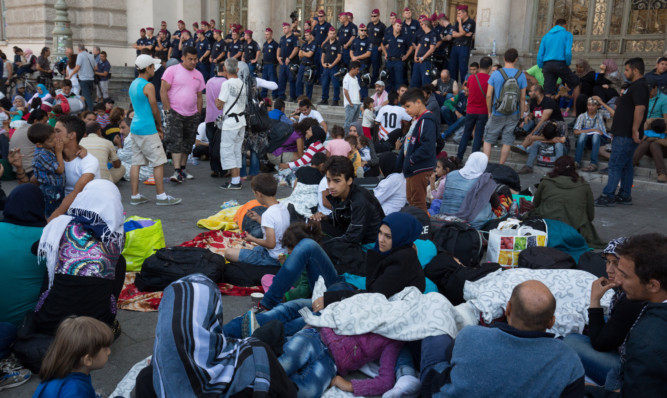Thousands of migrants remain stranded at Budapest’s main international railway station as authorities stick to European Union rules and prevent them from leaving for Germany and other countries west of Hungary.
Around 3,000 migrants are at Keleti station in the Hungarian capital, many camping outside the main entrance guarded by police, who said citizen patrols were assisting them in keeping order.
Volunteer groups accustomed to providing food, clothing and medical assistance to a few hundred migrants at a time struggled with the large number of people staying in every corner of the station’s sunken plaza.
More than 150,000 migrants have reached Hungary this year, most coming through the southern border with Serbia. Many apply for asylum but quickly try to leave for richer EU countries.
Hungary’s police said in a statement they intend to reinforce their positions outside the terminal as the volume of migrants arriving from Serbia continues to grow by the hour. They said officers working jointly with colleagues from Austria, Germany and Slovakia also were searching for migrants travelling illegally on other Hungarian trains and described the security push as compatible with the EU’s policy of passport-free travel.
Efforts to control, curtail and protect migrants continued unabated elsewhere across Europe. French authorities said services on the cross-Channel Eurostar trains were returning to normal after serious overnight disruptions triggered by reports of migrants running on the tracks and trying to climb on top of trains.
Passengers aboard one Paris-to-London train said their service was suspended because migrants trying to climb aboard the train damaged fire safety equipment. In tweets, passengers also described seeing migrants running along the roofs of another train near the migrant-besieged French port of Calais.
Hungary’s prime minister, Viktor Orban, is scheduled to meet EU chiefs on Thursday to discuss his country’s handling of its unprecedented flow this year of more than 150,000 migrants, chiefly from Syria and other conflict zones. While Germany said it expects to receive 800,000 migrants this year, quadruple last year’s figure, many EU members face criticism for failing to commit to housing more asylum seekers.
In non-EU member Iceland, a populist movement is challenging the government’s pledge to host just 50 Syrians. The newly launched Syria’s Calling pressure group said thousands of island residents had gone online over the past 48 hours to commit to opening their homes to a war refugee. Others called on Iceland to open a disused army base for migrant housing.
Naval vessels from several nations continued to patrol Mediterranean waters off the coast of Libya in hopes of preventing more mass drownings of migrants. A Norwegian vessel said it was carrying about 800 rescued migrants, including 11 pregnant women and more than 30 children, to Cagliari on Italy’s island of Sardinia.
